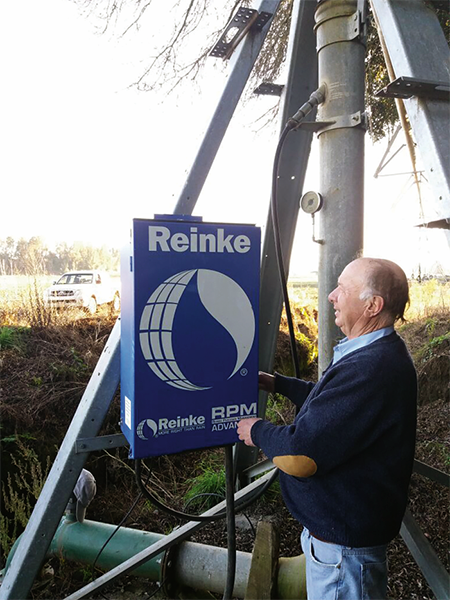Record-Breaking chicory production results from reinke pivots
Subscribe to our email newsletter!
|
Made in Nebraska, United States of America, Reinke pivots are more efficient and durable than similar systems on the market. They are built from high-strength, yet lightweight materials that provide greater ease of movement, while limiting breakdowns and jams — very important in heavy soil.
|
|
In one recent season, Andrés Villagra harvested 91 tons of chicory per hectare (37 tons per acre) — an amount he had never before obtained — from his field in central Chile’s Bío Bío region. By comparison, the national chicory crop averages 60 tons of chicory per hectare (24 tons per acre). It was no miracle, however. Everything had to be done correctly — especially irrigation, which Villagra accomplished with Reinke technology.
“It was the sum of many factors,” Villagra said. “We used a very good field — 18 hectares (44 acres) of sandy soil — and the chicory continued a rotation following seed corn and sugar beets.”
Lime and other supplemental nutrients were applied, and an early August planting took advantage of wintertime
moisture, thereby maximizing water requirements. Well-timed applications of herbicides and antifungal agents also were essential. Everything is facilitated by the dealer, which provides seed and technical advice.
Lime and other supplemental nutrients were applied, and an early August planting took advantage of wintertime
moisture, thereby maximizing water requirements. Well-timed applications of herbicides and antifungal agents also were essential. Everything is facilitated by the dealer, which provides seed and technical advice.
The harvested chicory is used in the production of functional fibers inulin and oligofructose under the Orafti® brand, a subsidiary of BENEO.
Summer: The Great Water Challenge
In Chile, December and January mean arid conditions and temperatures approaching 40° C (104° F). All 18 hectares of Villagra’s field receive pivot
irrigation, but close attention still must be paid, he said.
“I handled it personally,” he said. “I walked the field day and night, even on Sundays and holidays. I regulated it myself to deliver the right amount
of water for the soil conditions and humidity. The field is uneven in some places, but through precise irrigation, I can overcome it.”
A longtime farmer, Villagra remembers the first steps he took toward mechanized irrigation. “In the old times, water was simply dumped,” he said.
“My first equipment was diesel-powered spools; later came pipes and sprinklers, which were expensive. Any time we had plenty of sugar beets or chicory, the aluminum pipes were not enough to cover everything — we had to move them from place to place, which was a tough job. Not only did it cost more in labor, you could never be certain the person in charge would do their job. The same part of a field could be watered for six hours because the man in charge was taking a nap under a tree.”
With funding from IANSA, a Chilean refining company, Villagra purchased his first Reinke lateral irrigation system in 2011. The next year, he bought two fixed pivots, each of which has five towers and operates over 180 degrees. Water is pumped from the nearby Larqui River.
Precise Irrigation Control
In an interview published in GrupoAgro magazine, Villagra commented that he had harvested 80 tons per hectare (32 tons per acre) of chicory in the past, followed by a somewhat lower yield. Why was the yield low — and furthermore, how was it followed by a record harvest?
“I used a different field with a heavier, chalkier soil,” he said. “It was only partially irrigated by pivot. This particular season, the field was 100 percent under pivot, with which you can control irrigation exactly. Water management is so important. You have to verify the amount the crop needs is actually applied.”
The recognition of his record yield was a pleasant surprise, Villagra said. He thinks some luck was involved — the season presented favorable conditions, after all — but above all else, it reaffirmed his belief a job done well and on time, leads to favorable results.
“I know that chicory production in other parts of the world is an entirely different reality,” he said. “In Europe, they don’t use artificial irrigation; chicory and beets are supplied naturally by rainfall. They have other costs and other yields. In Chile, mechanized irrigation is very important in producing any crop with a high water requirement.”
PRODUCTS |
FIND A DEALER |
RESOURCES |
ABOUT |
EMPLOYMENT |
© 2024 REINKE MANUFACTURING CO., INC.
ALL RIGHTS RESERVED
ALL RIGHTS RESERVED

